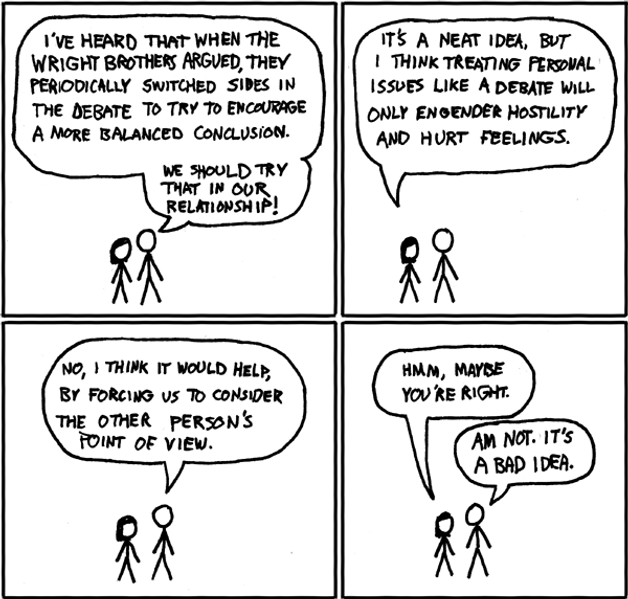Talking Big Ideas.
“When you want to criticize…concentrate on the best stuff.”
~ Dan Dennett, Intuition Pumps and Other Tools for Thinking
Shortly after moving to DC, I got an entry-level job at a law firm.
Once a month, the attorneys would share all the potential cases they were working on. Anyone at the firm could read them — even a lowly media assistant like me.
I remember sitting in my cube, reading my first potential case. Something I’d never seen before popped out at me. It’s stuck with me ever since.
There was a list of the best reasons to take the case. And then, immediately after, the best reasons to not take the case.
Attorneys had to argue against cases they wanted to bring!
I spoke to one of them about this. She said when you’re thinking deeply about important issues, it’s essential to see them as clear as you possibly can.
“To be effective at a high level, you have to learn to understand and articulate the best arguments against the ideas you’re fighting for,” she said.
How often, I wondered, do I honestly try to see things from opposing viewpoints? How often do I seek out the best spokespeople for ideas I disagree with?
I couldn’t think of a single time I’d tried this.
*****
Ted Sturgeon was a famous writer.
In 1953, he stepped behind the podium at the World Science Fiction Convention in Philadelphia, looked out at Isaac Asimov and the rest of his audience, and lamented the way critics treated their genre.
“They say ‘ninety percent of science fiction is crud!’”
The crowd groaned. They probably didn’t expect his next lines: “Well, they’re right. Ninety percent of science fiction is crud!”
He continued:
But then, ninety percent of everything is crud, and it’s the ten percent that isn’t crud that is important, and the ten percent of science fiction that isn’t crud is as good or better than anything being written anywhere.
Ninety percent of everything is crud. Nearly 70 years later, this is known as Sturgeon’s Law.
If we want to effectively critique something, we have to ignore the crud and focus on the good stuff. The best arguments and the best spokespeople.
Only hacks and ideologues seek out, as Sturgeon put it, “the worst examples of the field for ammunition.” The philosopher Dan Dennett added that, in taking this approach, “the only one you’ll discredit is yourself.”
Think of the self-righteousness and shouting so common on social media and compare it to the meticulous and honest preparation for Supreme Court arguments.
One approach is cringe-inducing and shameful. The other is a model on how to advance ideas and make the world better.
Consider this as you fight for the ideas you hold dear. As you build your speeches and discuss your thoughts with others. Make it a habit to seek out the best possible arguments and examples for your position — and for your opposition.
***
![]() IDEA
IDEA
Before you criticize an idea, understand its best arguments. Ignore the crud.
There’s a Talmudic tradition of arguing as best you can against positions you hold. Take a moment and try doing this. Think about an idea or policy you believe in strongly and want to advance. Find a respected advocate who holds an opposing view and read their arguments. In your own words, see if you can make their case in a convincing way.
***
BONUS: A short cartoon on the Wright Brothers.

Stephen King says Ted Sturgeon was among the best science fiction writers in history. Ray Bradbury, Robert Heinlein, and Kurt Vonnegut all idolized him.
If you haven’t read Sturgeon yet, consider checking out Godbody or More Than Human. They are timeless masterpieces in storytelling.
If you find this useful, please subscribe to our free weekly newsletter.




